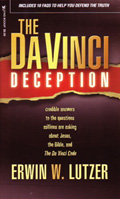
Erwin W. Lutzer
Reviewed by: David G. Barker
The Da Vinci Deception, by Erwin W. Lutzer. Published by Tyndale House, 2004. Hardback, 122 pages, list price $14.99; paperback, $6.99. Reviewed by Pastor David G. Barker.
Dr. Lutzer is the senior pastor of the Moody Church in Chicago.
This book joins ranks with others, including Breaking the Da Vinci Code, by Darrell Bock; The Da Vinci Hoax, by Olson and Miesel; and (from a Reformed perspective) Cracking Da Vinci's Code, by James L. Garlow and Peter Jones.
Lutzer's book is intended to be a training tool for pastors, to assist in preparing their congregations for the May release of the movie version of Dan Brown's bestseller, The Da Vinci Code. An accompanying CD contains a fifteen-minute monologue in which Lutzer warns pastors not to underestimate the impact that the movie will make. He challenges pastors to use the movie as an opportunity for evangelism, calling them to "educate, motivate, and stimulate" members to be prepared to answer the lies and deceptions in the book and, undoubtedly, in the movie as well. His book, then, is targeted to laymen and is written in a pastoral, unassuming style.
First, Lutzer relates the plot of The Da Vinci Code, to assist those who haven't read it yet, whose consciences won't allow them to read it, or who were not able to follow the plot when they did read it.
His treatment of the early church is only barely sufficient to understand the times. However, his treatment of historical Gnosticism is well done, enlightening the reader without actually getting into its complex theology. Later, this allows Lutzer to demonstrate how the mystical, indefinable motivations that empowered Gnosticism are alive and well in today's man-centered spirituality.
The chapter on Mary Magdalene tells how she has been treated historically, in contrast to Gnostic claims that she was put down in a gender tug-of-war for control of the church. But Lutzer's own position on women in the ministry is vaguely stated: "I agree that historically the church can be faulted for not giving women their rightful place in Christian ministry." He does not explain that stance, and that may be enough to render the entire book inappropriate in the eyes of some.
His chapters dealing with the integrity of the Scriptures - the development of the canon and the Bible's ability over the years to withstand attacks - are full of hope and reassuring.
Lutzer does provide the Christian with a bit of "ammo" to use in evangelistic outreach. What is missing, however, is any discussion of the continuing cultural impact of relativism on the very definitions of truth, history, and the biblical world-view. The Da Vinci Code, in book form, has been a powerful source of propaganda in this arena, and the movie threatens to be just as effective, if not more so.
February 01, 2026
January 25, 2026
January 18, 2026
January 11, 2026
Texts that Transform: Church and Ministry
January 04, 2026
December 28, 2025
December 21, 2025
© 2026 The Orthodox Presbyterian Church